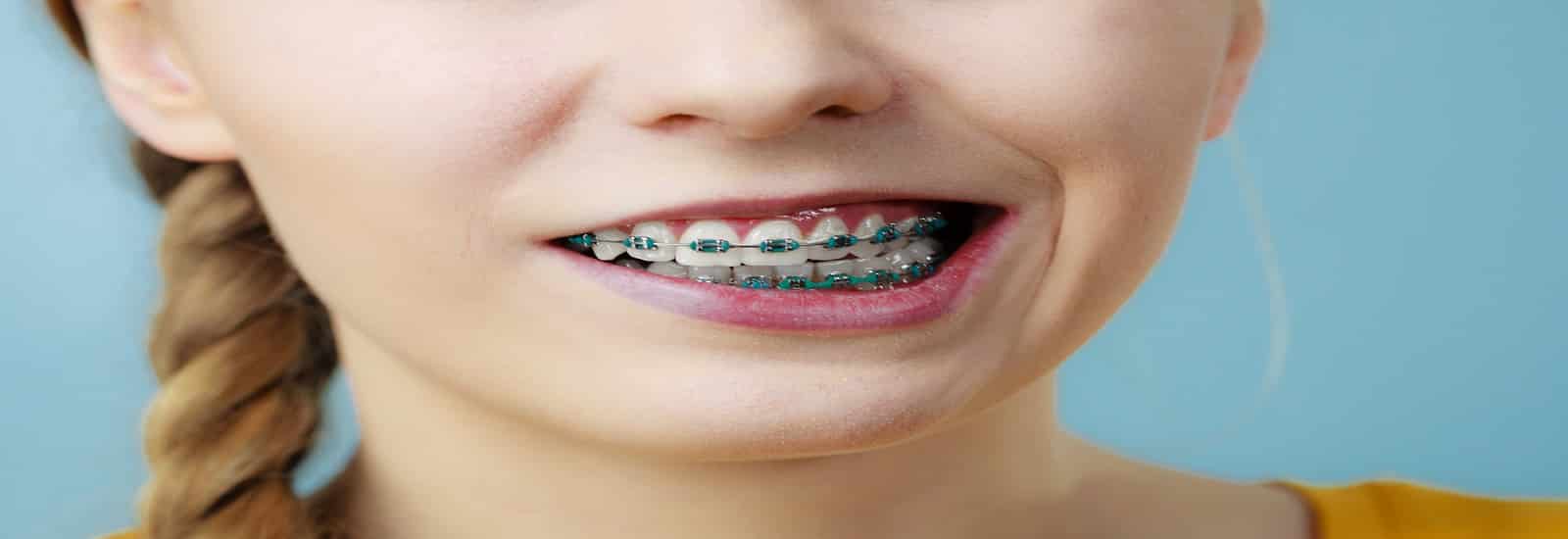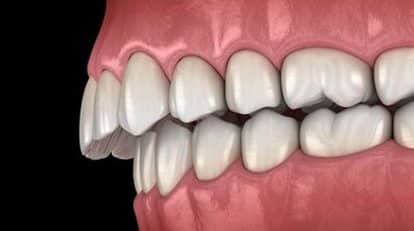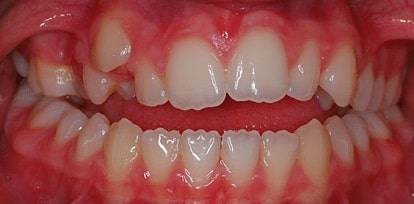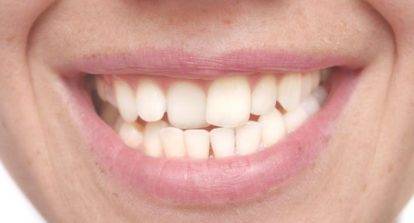Orthodontic / Braces Treatment

Talk to a Dentist Now!
Table of content
- What is Orthodontic/Braces Treatment?
- Why Should I Get Braces?
- What are the benefits of correct teeth alignment and Braces?
- What is the Cost of Orthodontic or Braces Treatment?
- What are the Different Types of Braces Available?
- What would it be advisable for you to do after Invisible Braces treatment?
- At What Age Should You Get Braces?
- How to Go About Orthodontic Treatment?
- Is the Extraction of Teeth Required for Orthodontic Treatment?
- What Should a Detailed Orthodontic Treatment Plan Include?
- How Long Does Orthodontic Treatment Take?
- What happens when the teeth are in the right position?
What is Orthodontic / Braces Treatment?
Are you confident about your smile? This question usually has mixed responses because most people wish they had a more attractive, well-aligned smile. However, not everyone has well-aligned teeth to give them a perfect smile, isn’t it? Malalignment of teeth can be resolved with orthodontic treatment.
When you have improper teeth alignment, it becomes difficult to smile. A proper fixed orthodontic treatment can help you to achieve teeth alignment. Overbite, underbite, crossbite, and the gap between teeth, etc are some of the problems caused by misalignment in teeth.
With Orthodontic treatment, you can fix all these teeth misalignment problems and achieve proper teeth alignment. Many people are unaware of the Orthodontic treatment cost in India, which makes them avoid Orthodontic treatment early. Orthodontic treatment, commonly called braces treatment, involves the correction of misaligned teeth using wires.
Apart from aligning teeth, orthodontic treatment helps to restore a person’s bite, the function of their teeth, and aesthetics. It plays an important role in preventing dental conditions like cavities and gum diseases, that commonly occur in the case of malalignment.
Why Should I Align My Teeth?
Apart from aesthetics, most people are not bothered about their crooked teeth. However, little do they know that their misalignment can become a problem for their dental health. Here are a few conditions that need a wire on your teeth:
- Overbite:

- Crossbite: In an ideal scenario, your upper teeth lie buccally(towards the cheek side) in comparison to your lower teeth. In some cases, however, the lower teeth overlap the upper teeth, a condition known as a crossbite that can be corrected with proper dental correction treatment.
- Open Bite:

- If your upper teeth fail to overlap your lower teeth, the condition is called an open bite and requires orthodontic correction.
- Misplaced midline: When the center of your upper front teeth does not line up with the center of your lower front teeth.
- Spacing: In ideal cases, adult teeth do not show spaces between them. However, due to a mismatch in jaw-to-tooth size or missing teeth, there is often an unnatural spacing between teeth that requires orthodontic correction.
- Crowding:

- Forwardly placed teeth: Due to jaw development issues, it can result in the forwardly placed upper or lower jaw, and subsequently the teeth. If left untreated, this condition can result in many dental issues.
What are the benefits of correct teeth alignment and Braces?
Though we are not naturally born with perfectly aligned teeth, it is possible to get our teeth aligned using Wire treatment. But, what are the benefits of getting our teeth aligned?
- Efficient chewing of food
- Improvement of speech
- Improvement in dental hygiene
- Ease of maintaining good oral hygiene
- Reduced risk of cavities and gum diseases
- Reduced attrition or grinding of teeth
- Corrects protrusion of teeth, which are a higher risk of trauma
- Improves smile that helps boost confidence and self-esteem
So, dental alignment is not just to improve a person’s smile or provide superior aesthetics but to help improve oral health as well.
What is the Cost of Teeth Alignment Treatment?
When advised orthodontic treatment using Braces/Wire, most patients worry about the cost of treatment. Orthodontic treatment costs are based on the type of dental braces chosen by the patient.
Another factor that determines the cost of your orthodontic treatment is the individual diagnosis and treatment plan. You can check out our online pricing list for the cost of the individual wires for the mouth.
What are the Different Types of Braces Available?
As mentioned above, there are different types of braces that are available for patients to choose from. At Sabka Dentist, we provide a wide range of dental alignment wires based on the individual’s case, lifestyle choices, and budget. But how do braces work? Are they different?
There are broadly three types of Orthodontic treatment: Metal braces, Ceramic braces, and clear aligners. The comparative Orthodontic treatment price is lower for the metal braces and higher for the clear aligners. Although all different types of treatment give the same results of proper teeth alignment, the comfort level differs a lot.
Here are the main types of braces available at Sabka Dentist:
- Metallic- As the name goes, these are metallic and are of two types:
- Basic Metal- The orthodontists at Sabka Dentist use top-quality metallic braces to provide controlled orthodontic movements to give you a successful treatment.
- Self-Ligating Metal- These are advanced metals that are at least 30% faster than traditional metals. These types of material do not need elastics and therefore, are easy to clean and maintain by the patient. At Sabka Dentist, we use the best quality self-ligating metal braces that apply low friction and make it comfortable and convenient for the patient.
- Ceramic- Since the metallic smile of the metal was a put-off for patients, ceramic braces were introduced. These are tooth-colored and have far better aesthetics compared to metals. These are further of two types:
- Basic Ceramic
- Self-Ligating Ceramic
- Invisible or Clear Aligners- These are the latest types of aligners and have been introduced to make teeth alignment treatment even more aesthetic than ceramic braces. They are also called clear aligners and are essentially transparent trays that need to be worn on the upper and lower teeth to bring about teeth alignment. They are removable, invisible when worn on the teeth even at close distances, and are very comfortable. These wires are customized for each patient and are manufactured using CAD/CAM technology. While brushing and ways to floss with braces of the fixed kind can be challenging, maintaining oral hygiene with invisible aligners is the easiest.
What would it be advisable for you to do after the Invisible Braces treatment?
There are relatively few post-treatment rules separated from the essential ones. You may be approached to have a check on eating hard nourishments. As a rule, you can even expel them while eating.
Likewise, depending upon the state of your teeth, you may need to wear them for a time of 12 to two years. Consequently, consistently ensure that you keep your meeting with your dental specialist. Finding the best invisible wire near you will give you the best improvement and results.
At What Age Should You Get A Teeth Alignment Treatment?
Many people have a misconception that dental braces are for kids. However, this is not the case. Yes, children are the best age for alignment treatment, but adults can also benefit. Any individual with healthy teeth and gums can get their teeth aligned. However, orthodontic treatment is best carried out in children due to their flexible bones and continuing growth.
So parents must bring their children to visit the orthodontist when their first permanent teeth erupt. In many cases, an orthodontic problem can be prevented by a timely intervention by the orthodontist. At Sabka Dentist, we perform preventive orthodontics as well.
How to Go About Orthodontic Treatment?
To begin orthodontic treatment at Sabka Dentist, you must visit our orthodontist. You will be asked to report with a full mouth X-ray and a lateral profile X-ray for facial, dental, and skeletal evaluation. After viewing your X-rays and performing a clinical evaluation, the orthodontist will devise a treatment plan.
You will also be given the treatment duration, cost, and a complete quotation. Once you have understood the treatment plan and are prepared to go ahead with the treatment, your treatment will begin.
Is the Extraction of Teeth Required for Orthodontic Treatment?
Teeth extractions are not required for all orthodontic treatment. The reason teeth are extracted is that there isn’t enough space in the arch to move the teeth into alignment.
The space obtained after teeth extraction is used to straighten teeth and align them. After a complete evaluation of your case, the orthodontist will inform you whether you need dental extractions or not.
What Should a Detailed Orthodontic Treatment Plan Include?
Orthodontic treatment usually occurs in two phases: Active and Retention. While the active phase of treatment involves the movement of teeth into alignment, the retention phase includes retaining the teeth in their position using a retainer.
Orthodontic treatment can be performed using removal and fixed appliances and sometimes, a combination of the two is also used. The type and approach of your orthodontic treatment will depend upon your case and the severity of the malocclusion.
Each case is treated differently and appropriate appliances are chosen. These appliances are used to cause movement of teeth, refrain muscles, and bring about jaw growth. Special types of appliances are used in kids to direct jaw growth and these are called Myofunctional Appliances.
Your orthodontic treatment plan also includes how to handle orthodontic emergencies. Your orthodontist is well-trained to help you manage these concerns throughout your treatment if the case arises.
How Long Does Orthodontic Treatment Take?
One common question that patients ask their orthodontist after getting their braces treatment started is – “When will my aligners come off?” and “Can braces be removed early?” In most cases, orthodontic treatment takes 1.5- 2 years. However, some simple cases take less than a year to complete and the more complex cases can take 3 years or longer to complete.
Patients are often excited about removing braces and once the orthodontic treatment is completed, they look forward to flaunting their new smile! Everyone has the right to a perfect smile and orthodontic treatment using dental wires is the most natural way to achieve it.
At Sabka Dentist clinics, we are motivated to give beautiful smiles to our patients who have multiple options of braces to choose from based on their needs and budget! Visit us today for your smile transformation!
What happens when the teeth are in the right position?
After the orthodontic treatment is done you will find the teeth in a proper position, but to give it a proper shaping, this is known as the maintenance period, and the apparatuses that hold the teeth set up are called retainers.

The retainers hold recently fixed teeth in position while the encompassing gum and bone settle. The retainers can be removable or fixed, contingent upon the first issue.
You can look for any “Sabka Dentist” ortho dental clinics near you. They are one of the leading Orthodontic treatment providers in India. Sabka Dentist provides Orthodontic treatment to people at an affordable cost in India and makes it easier to get the treatment.
The Orthodontic treatment before and after results can reflect the improvement in your smile. Come to the nearest branch of Sabka dentist to get better Orthodontic treatment.
Expert's Opinion
Dr. Rupali Gujar Dental Director of Sabka Dentists says “You don’t need to hide or be conscious of your smile anymore and get orthodontic treatment for crooked teeth at Sabka Dentist clinics”.
Dr. Ankita Gada Dental Director of Sabka Dentist says “Getting orthodontic treatment helps to improve one’s smile and gives them confidence and boosts self-esteem”.
Dr. Manan Dhulia Dental Director of Sabka Dentist says “Teeth alignment using braces helps to maintain better oral hygiene and prevents cavities and gum infections.”
References
- Braces and retainers – Webmd
- Learning about braces – Dentalhealth.org
- Braces and Orthodontics- American Dental Association(ADA)
Frequently Asked Questions
How long will it take for braces to straighten my teeth?
The length of orthodontic treatment for a patient is determined by multiple factors, which include the severity of malocclusion, age, health of teeth, biological response, etc. Nevertheless, typical orthodontic treatment takes between 12 and 36 months.
Are braces painful?
Dental braces are not painful. In most cases, there might be mild discomfort after the orthodontic wire is engaged into the brackets.
What should you avoid with braces?
With braces fixed on the teeth, one should avoid eating food that has a sticky consistency or is hard enough as it can lead to the breaking of the brackets and thus delay the total treatment time.
What happens if I am not regular in my braces appointment?
If you are irregular in your appointments, then the intended time for the completion of the treatment will be prolonged and the teeth movement will be affected.
Is it okay to get braces at the age of 30?
There is no age limit for getting teeth braces done. The only consideration is that the teeth should be periodontally sound.
Can you stop Orthodontic Treatment midway?
It is not advisable to stop orthodontic treatment midway as relapse will most likely occur.
What is the purpose of retainers after having braces?
The retention phase follows orthodontic treatment. Orthodontic retainers are custom-made devices that are usually made of wires and acrylic. They aim to hold teeth in their new position. Once the orthodontic treatment has been completed, there will remain a risk of relapse i.e. the tendency of teeth to return to their original position.
Relapse can occur due to multiple factors, which include the recoil of periodontal fibers, pressure from surrounding soft tissues, occlusion, and the patient’s continued growth (as seen in adolescents).
By using retainers to hold the teeth in their new position for a certain length of time, the surrounding periodontal fibers can adapt to changes in the bone which will minimize any changes to the final tooth position after the completion of orthodontic treatment.
Removable retainers are only required to be worn part-time, while fixed retainers consist of a passive wire bonded permanently to the lingual surface (tongue side) of incisors.
Are Invisible Braces better than Braces?
The following are the advantages of Invisible Braces over Braces:
- Removable: With Invisible Braces, the trays can be removed, allowing you to eat and drink without food getting stuck in braces.
- Aesthetic: Clear trays may not even be noticed when the patient is wearing them.
- Comfort: Aligner trays can be more comfortable as there are no brackets involved that can otherwise create sores.
- Cleaning: It is easier to keep the Invisible Braces trays cleaner than braces.
Visit Sabka Dentist now to get the best orthodontist near you.
About Author

A confident Healthcare Professional with over 8 years’ experience successfully diagnoses & treats patients’ dental conditions. Skilled in Endodontics, Implantology, Healthcare, and Surgery, a confident communicator who can relate well to dental patients. Having a proven ability to ensure that dental practices in surgery are continuously updated to provide first-rate care to patients and their families.



